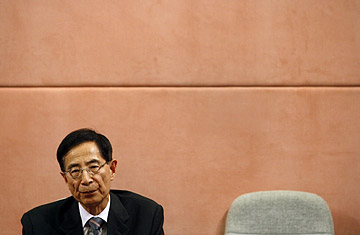
Hong Kong lawmaker Martin Lee at Hong Kong's Legislative Council on March 28
Martin Lee has a lot of nicknames. To human rights activists, he is Hong Kong's "Father of Democracy." To Chinese officials and pro-Beijing politicians in Hong Kong, he is a "running dog of the colonialists." But the soft-spoken, 69-year-old lawyer has a relaxed air about him that belies the political waves he has made in the past 23 years. Last month, Lee announced that he would not run for another seat in Hong Kong's Legislative Council after his current term ends in July. "I think we should allow younger people to take over," he says. "But I'm not going to retire from my fight for democracy."
That fight has made Lee the face of Hong Kong's democracy movement, especially during the territory's 1997 transition from British to Chinese rule. Under the current "one-country, two systems" policy, voters in Hong Kong may directly elect half of their 60 legislators, but Beijing retains the power to appoint the territory's chief executive. Lee has doggedly lobbied for greater electoral freedom for Hong Kong citizens. "Martin is for Hong Kong what Aung San Suu Kyi is for Burma, and what the Dalai Lama is for Tibet," says Carl Gershman, President of the National Endowment for Democracy, the Washington D.C. pro-democracy organization that awarded Lee its Democracy Award in 1997. "He's the strong voice, the person who's been there such a long time and hasn't compromised his fundamental principles."
Lee failed to reach his goal of establishing full democracy in Hong Kong, but he stresses that he and the Democratic Party he founded in 1994 have achieved one thing: "No one today in Hong Kong will say that democracy is bad for Hong Kong," he says. "The only dispute is the timing." Hong Kong's Basic Law, the mini-constitution enacted in 1997, proposed the introduction of universal suffrage as early as 2008. In 2004, Beijing postponed that date until at least 2012. Then last December, Beijing announced that Hong Kong voters will have to wait until 2017 and 2020 to elect their chief executive by popular vote and to vote for all 60 seats in the Legislative Council.
At the height of his popularity, Lee helped lead half a million marchers through the streets of Hong Kong on July 1, 2003, forcing pro-Beijing lawmakers to abandon a controversial anti-subversion bill. Since then however, the number of marchers in the annual protest has steadily dwindled. Lee doesn't seem worried. "When there's a good reason again, they’ll come out," he says. "Never discount Hong Kong people's enthusiasm."
The sixth of seven children, Lee was born in Hong Kong but was raised in nearby Guangzhou, on the mainland. He earned his B.A. from the University of Hong Kong before studying law at Lincoln's Inn in London. After returning to Hong Kong to practice law, he was elected to the Legislative Council in 1985 and became a member of the Beijing-appointed committee to draft Hong Kong’s Basic Law. But when Beijing cracked down on protestors in Tiananmen Square in 1989, Lee's role in leading protests in Hong Kong led to his ouster from the Basic Law committee. Since then, he has been banned from visiting the mainland, with the exception of a brief Legislative Council visit to Guangdong province in 2005.
"It's obviously painful," he says of his ban from the mainland. "As a Chinese citizen, I'm not allowed back to my own country even though I'm welcome in every other country in the world." In 2000, Lee became the first non-European to receive the Schuman Medal for peace and human values, awarded by the European People's Party and the European Democrats in the European Parliament.
Though he is stepping down from the Legislative Council, Lee plans to continue campaigning for democracy and working as a lawyer. Still, he says, "I will not be satisfied until we have in place a genuinely democratic system." He'll have to wait 12 more years to see if Beijing's promise is met.
